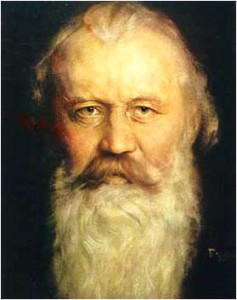The Death Melodies Series (DMS) continues with Romantic composer Johannes Brahms.
 Born in Hamburg, Germany in 1833, Brahms exhibited virtuosic abilities as a child. Much of his childhood was spent playing around the local scene including dance clubs (by his own account, “brothels”). As a result, some have concluded that Brahms suffered sexual trauma as a child, but there’s no evidence.
Born in Hamburg, Germany in 1833, Brahms exhibited virtuosic abilities as a child. Much of his childhood was spent playing around the local scene including dance clubs (by his own account, “brothels”). As a result, some have concluded that Brahms suffered sexual trauma as a child, but there’s no evidence.
Brahms received a formal education in composition and toured around Germany with violinist Joseph Joachim. The result of the endeavor proved to be beneficial for Brahms’ career. He was invited to play for Liszt, though Brahms’ nerves were at a fever pitch and he couldn’t perform. Liszt then decided to play Brahms’ Scherzo, Op. 4 by sight, which he in turn simultaneously critiqued while he played.
Shortly after, Brahms became acquainted with the Schumanns. The first time Robert Schumann saw him play, he claimed that Brahms was a genius in his diary. Later, Robert Schumann jumped into a river while trying to kill himself. He survived and was put into an asylum. Brahms decided to keep Robert Schumann’s wife, Clara, company and help around the house. Though tensions were high with Robert being in an asylum and diminishing in health, Brahms started to write his first symphony. Clara aided him and they loved being around each other. She advised Brahms that his symphony that he was working on would be better suited as a piano concerto (below). Robert Schumann eventually starved himself to death in the asylum. Out of respect for the deceased composer, Brahms concluded that he wouldn’t “get together” with Clara, and he left.
Brahms spent most of his career in Vienna. He donated much of his money to charities and friends, and he wore the same worn patched-up clothes. Brahms was also known as a prankster. He had a trick rocking chair that he would get people to sit in. They’d either end up falling completely backwards or falling forward on their knees, and Brahms would just laugh at them. He was also keen on walks in nature.
Musically, Brahms was one of the dominant composers of the Romantic Period. When he was younger he was intimidated by Beethoven, but he eventually overcame his personal hurdles and wrote some very remarkable works. His first symphony is commonly referred to as Beethoven’s tenth.
http://www.youtube.com/watch?v=-wzHj0CylLs
4 CommentsTags: Brahms, death melodies series

